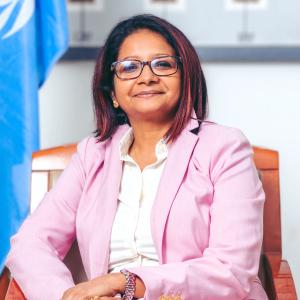- Hon. Mudrick Ramadhani Soraga, Minister of State, Office of the President, Economy and Investment
- Mr. Makame Mwadini Silima, Representative from the Office of the Urban West Regional Commissioner
- Mr. Ahmed Khalid Abdulla, Registrar of NGOs in Zanzibar
- Rashid Mohammed Rashid, Representing Zanzibar’s NGOs Forum
- Representatives from different NGOs, CSOs and Youth Organizations
- UN Colleagues
- Members of the Media
- Invited Guests
Habari za Asubuhi.( Good morning)
Asalaam Aleikhum.
I am pleased to join you today for the International Day of Peace and thank all the organizers for their commendable efforts in organizing today’s commemorations and all the activities that have preceded it.
I congratulate everyone who has taken part in these different activities, especially those who planted trees yesterday and joined the peace jump to the Indian Ocean; Hongereni sana! (Congratulations!)
It is good to see a large group of different stakeholders who continue to play a role in sustaining peace in Zanzibar and around the country. Recent global developments have shown us that we should not take peace for granted.
This is especially true in our current context as the world is still recovering from the COVID-19 pandemic while experiencing the effects of higher prices of oil, fertilizers, wheat, maize, and various other damaging effects caused by the war in Ukraine and other factors. We have already seen examples of these economic impacts leading to instability in different parts of the world.
There is a clear link between peace and development. When there is conflict, children cannot receive a proper education, hospitals are destroyed, markets are disrupted, and the economy slows down. Whereas a peaceful society, such as Tanzania, can set its development priorities and work with other countries to implement and align their priorities with global and regional frameworks such as the Sustainable Development Goals (SDGs) and the African Union (AU) Agenda 2063.
Kindly allow me to deliver the UN Secretary-General’s Statement for this year’s International Day of Peace. And I quote:
“As we mark this International Day of Peace, people and our planet are in crisis.
Conflicts driving record numbers of people from their homes.
Deadly fires, raging floods and soaring temperatures.
Poverty, inequalities and injustices.
Mistrust, division and prejudice.
This year’s theme reminds us that peace is not automatic.
Peace is the result of action.
Action to accelerate progress towards the Sustainable Development Goals and ensure that no one is left behind.
Action to end the war on our planet and its natural gifts.
Action to uphold and protect the human rights and dignity of every person — especially as we celebrate the 75th anniversary of the Universal Declaration of Human Rights.
Action to use the timeless tools of diplomacy, dialogue and collaboration to defuse tensions and end conflict.
And action for those millions of people living through the horrors of war.
Peace is not only a noble vision for humanity.
Peace is a call to action.
Let us commit to build, drive and sustain peace for all.
End of quote.
At this moment, the 78th session of the UN General Assembly is ongoing at UN HQ in New York. World leaders have gathered at a time of great crises, at a time of ‘maximum dangers and minimum agreement’, As noted by the UN S-G. Indeed, the UN S-G started his inaugural speech with a very sobering phrase: ‘the world is unhinged’. But at the heart of his proposed solutions was a simple idea: ‘determination’. If the world and its leaders have determination to solve problems, problems will be solved.
Hon. Minister,
As you will be aware, last year, the UN and the Government of the United Republic of Tanzania launched the UN Sustainable Development Cooperation Framework (UNSDCF) 2022-2027. The UNSDCF was developed jointly with the Government and will guide the work of the UN in Tanzania for the next five years.
The UNSDCF has four overarching pillars. The first is PEOPLE which seeks to improve the well-being of Tanzanians. The second is PROSPERITY which focuses on increasing production, productivity and incomes. The third is PLANET which aims to improve access to clean energy and achieve more sustainable management of Tanzania’s resources.
The fourth pillar is called ‘ENABLING ENVIRONMENT’. This pillar recognizes that to achieve the first three, you need an enabling environment where people can access justice, human rights are upheld, there is gender equality and there is representative and inclusive governance.
We can deliver on all those pillars only if we have the determination, that the UN S-G highlighted in his speech at the General Assembly, and if we can work together.
I take this opportunity to commend the United Republic of Tanzania for being a beacon of peace and stability in East Africa and the rest of the continent for many decades!
It is no accident that Tanzania, COVID-19 notwithstanding, has experienced steady economic growth over the years. Peace is fundamental to this growth and also makes our job as development partners much more productive! We are committed to continue working with the Government, international community and all peace stakeholders to help Tanzania maintain its peace and accelerate its development.
I encourage everyone to not take Tanzania’s peace for granted by continuing to play their role with determination for sustaining peace, promoting tolerance, respect, fairness, justice, sympathy and compassion!
On this International Peace Day, I further encourage you to support the Sustainable Development Goals (SDGs). The SDGs are a blueprint for a more peaceful and sustainable world. In Tanzania, as well as in Zanzibar, the Government and the UN are committed to these shared global goals. The SDGs address the root causes of conflict, including poverty, inequality, and injustice. By supporting the SDGs, we can help to create a more peaceful world for all.
Allow me to conclude with the most precious words of Mwalimu Julius Nyerere: “Violence is unnecessary and costly. Peace is the only way.”
Asanteni sana!



